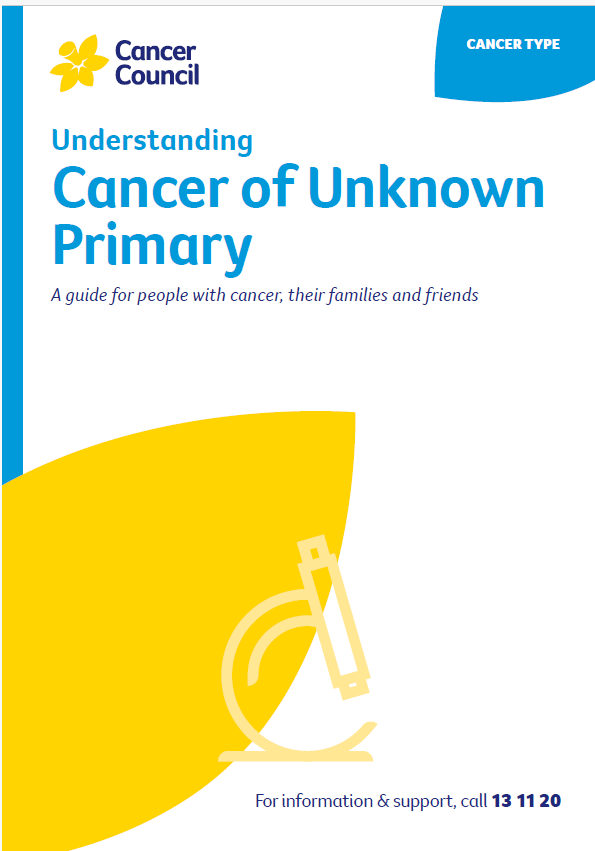- Home
- Cancer of unknown primary (CUP)
- Diagnosis
- Prognosis
Prognosis
Prognosis means the expected outcome of a disease. You may wish to discuss your prognosis and treatment options with your doctor, but it is not possible for anyone to predict the exact course of the disease.
To work out your prognosis, your doctor will consider:
- test results
- the type of CUP you have
- where the cancer is located and how far it has spread through the body
- how fast the cancer is growing
- how well you respond to treatment
- the impact the cancer has had on your health factors such as your age, fitness and medical history.
Although most cases of CUP can’t be cured, treatment can keep some cancers under control for months or years. Whatever the prognosis, palliative treatment can relieve symptoms such as pain to improve quality of life. It can be used at any stage of advanced cancer. See more on palliative treatment.
Discussing your prognosis and thinking about the future can be challenging and stressful. It is important to know that although the statistics for CUP can be frightening, they are an average and may not apply to your situation. Talk to your doctor about how to interpret any statistics that you come across.
Staging is a way to describe how far a cancer has spread. CUP cannot be given a stage because the primary cancer is not known and the cancer has already spread to other parts of the body when it is found. This is considered advanced cancer. For more information, see Living with Advanced Cancer and listen to our podcast series, The Thing About Advanced Cancer.
→ READ MORE: Your healthcare team
More resources
Prof Chris Karapetis, Network Clinical Director (Cancer Services), Southern Adelaide Local Health Network, Head, Department of Medical Oncology, and Director, Clinical Research in Medical Oncology, Flinders Medical Centre and Flinders University, SA (Clinical review); Dr Amey Aurangabadkar, Radiologist, Illawarra Radiology Group, NSW; Clare Brophy, Consumer; Prof Katherine Clark, Clinical Director of Palliative Care, NSLHD Supportive and Palliative Care Network, Northern Sydney Cancer Centre, Royal North Shore Hospital, NSW; Prof Wendy Cooper, Senior Staff Specialist, Tissue Pathology and Diagnostic Oncology, NSW Health Pathology, Royal Prince Alfred Hospital, NSW; A/Prof Richard Gallagher, Head and Neck Surgeon, Director of Cancer Services and Head and Neck Cancer Services, St Vincent’s Health Network, NSW; Dr Chloe Georgiou, Oncology Research Fellow, Australian Rare Cancer Portal, and Oncology Trials Fellow, Bendigo Health Cancer Centre, VIC; Dr Susan Harden, Radiation Oncologist, Peter MacCallum Cancer Centre, VIC; Justin Hargreaves, Medical Oncology Nurse Practitioner, Bendigo Health Cancer Centre, VIC; Dr Laura Kirsten, Principal Clinical Psychologist, Nepean Cancer Care Centre, NSW; Prof Linda Mileshkin, Medical Oncologist, Peter MacCallum Cancer Centre, VIC; Caitriona Nienaber, 13 11 20 Consultant, Cancer Council WA.
View the Cancer Council NSW editorial policy.
View all publications or call 13 11 20 for free printed copies.

